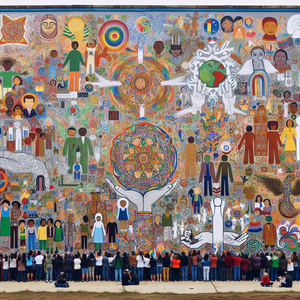Kahoot for Social Impact: Engaging Communities through Quizzes

Kahoot leverages gamification principles, making learning fun and engaging. This is particularly important in social impact initiatives where traditional methods may struggle to capture attention. By presenting information through quizzes, organizations can educate while entertaining, breaking down complex issues into digestible pieces. The platform allows users to create their own quizzes tailored to their specific goals, making it versatile for various audiences and objectives.
Case Study 1: Environmental Awareness Campaign
One notable example of Kahoot's application for social impact is a local environmental non-profit that sought to raise awareness about recycling and waste management in their community. They created a series of interactive quizzes that covered topics such as the benefits of recycling, the impact of plastic waste, and methods to reduce individual carbon footprints. During community events, participants engaged in friendly competitions, answering questions related to environmental practices. The result was not only an increase in knowledge but also a measurable uptick in recycling rates within the community. The fun, competitive element encouraged participants to spread the word, amplifying the campaign's reach organically. Through the integration of Kahoot, the organization not only educated attendees but also inspired them to take actionable steps toward environmental sustainability.
Case Study 2: Health Education Initiatives
Another compelling example comes from a health organization focused on promoting mental health awareness. They utilized Kahoot to host virtual workshops during Mental Health Awareness Month. By developing quizzes centered around mental health myths, coping strategies, and available resources, they engaged participants in a lively format that fostered discussion and reflection. The quizzes served as conversation starters, allowing participants to share their thoughts and experiences related to mental health. Feedback from attendees revealed a significant increase in understanding of mental health issues and the importance of seeking help. The interactive nature of Kahoot made the sensitive topic approachable, demonstrating its effectiveness in health education by empowering individuals with knowledge and reducing stigma.
Building Community Connections
Kahoot not only educates but also creates a sense of community. The platform allows for collaborative play, where participants can team up to answer questions, fostering a spirit of camaraderie. This is particularly valuable for non-profits aiming to build a sense of belonging among community members. For instance, a local charity focused on inclusivity organized a series of Kahoot events that brought together diverse groups within the community. By addressing topics such as cultural awareness and social justice, participants learned from one another's experiences, leading to insightful discussions and stronger community bonds. The shared activity helped bridge gaps between different demographics, promoting understanding and collaboration.
Challenges and Considerations
While Kahoot offers a dynamic way to engage communities, organizations must consider several factors to maximize its effectiveness. Understanding the target audience is crucial; quizzes should be tailored to their knowledge level and interests. Additionally, ensuring accessibility for all participants, including those with varying levels of tech-savviness, is essential for inclusive engagement. Organizations must also consider factors such as internet accessibility, age demographics, and cultural relevancy to ensure that their initiatives reach and resonate with their intended audiences.
Kahoot has emerged as a powerful tool for social impact, transforming the way organizations educate and engage their communities. Through interactive quizzes, non-profits and community groups can raise awareness about critical issues, foster connections, and inspire action in a fun and engaging manner. As the demand for innovative solutions to social challenges continues to grow, platforms like Kahoot will undoubtedly play a pivotal role in driving meaningful change. By harnessing the power of gamification, organizations can not only inform but also inspire communities to take an active role in addressing the pressing issues of our time. The future of community engagement is interactive, and Kahoot is at the forefront of this transformation, proving that learning can indeed be a shared adventure.
Community Engagement Specialist
Non-profit organizations, local government agencies, community development corporations
Core Responsibilities
Develop and implement community outreach programs to raise awareness about social issues.
Facilitate workshops and events that encourage participation and knowledge sharing among community members.
Analyze engagement data to assess program effectiveness and refine strategies.
Required Skills
Strong communication and interpersonal skills, with experience in public speaking and community facilitation.
Knowledge of social issues and local community dynamics.
Proficiency in using digital tools for communication and engagement, such as Kahoot or similar platforms.
Educational Program Coordinator
Educational institutions, non-profits focused on health or environmental education, community colleges
Core Responsibilities
Design and oversee educational programs that utilize interactive tools to engage learners in various subjects, including health and environmental awareness.
Collaborate with stakeholders to create relevant content tailored to specific community needs.
Monitor and evaluate program outcomes to ensure objectives are met.
Required Skills
Background in education or training, with experience in curriculum development.
Familiarity with gamification and interactive learning methodologies.
Strong organizational skills and ability to manage multiple projects simultaneously.
Digital Marketing Specialist for Non-Profits
Non-profit organizations, social enterprises, NGOs
Core Responsibilities
Create and execute digital marketing campaigns to promote community engagement initiatives and events.
Utilize social media, email marketing, and interactive content (like quizzes) to reach target audiences.
Analyze campaign performance metrics to optimize future marketing efforts.
Required Skills
Proficiency in digital marketing tools and platforms, with a focus on content creation and analytics.
Strong writing and storytelling skills to convey impactful messages.
Experience in community-focused marketing or non-profit industries.
Social Media Community Manager
Non-profits, educational organizations, community-focused brands
Core Responsibilities
Engage with community members across social media platforms, facilitating discussions on social issues and promoting interactive learning experiences.
Develop content strategies that utilize quizzes and polls to enhance user engagement.
Monitor and respond to community feedback while fostering a positive online environment.
Required Skills
Strong understanding of social media trends and best practices, especially in community engagement.
Excellent communication skills and the ability to create compelling content.
Familiarity with social media management tools and community engagement metrics.
Corporate Social Responsibility (CSR) Coordinator
Large corporations, NGOs, foundations focused on social impact initiatives
Core Responsibilities
Develop and manage CSR initiatives that promote social impact within communities, often through partnerships with local organizations.
Organize events and educational activities that involve employees and community members, using gamified solutions like Kahoot to enhance participation.
Measure and report on the impact of CSR initiatives to stakeholders and the public.
Required Skills
Strong project management skills and experience in corporate communications.
Knowledge of social responsibility practices and community development strategies.
Ability to collaborate effectively with diverse groups and stakeholders.


